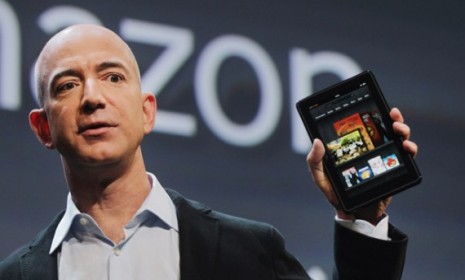4 reasons Amazon's Kindle Phone is a bad idea
The Kindle Fire made a splashy entrance and even managed to eat into the iPad's wide lead. Could Amazon do the same with a smartphone?

A free daily email with the biggest news stories of the day – and the best features from TheWeek.com
You are now subscribed
Your newsletter sign-up was successful
First came the Kindle Fire. Now Amazon is reportedly working with manufacturer Foxconn to develop its own smartphone, which would presumably take a cue from the Seattle-based e-tailer's popular line of Kindle tablets. The move is seen as Amazon's attempt to upset Apple and Google's goals in the digital content market by locking consumers into its robust catalog of e-books, movies, and mp3s — even though the phone will likely run on something similar to the already-established Android platform. But while the low-cost Kindle Fire was a rousing success, critics say that building a smartphone is an entirely different kind of beast, and Amazon would be wise to stay away. Here, four big reasons a Kindle-inspired phone might not be the best idea:
1. People use phones and tablets in very different ways
A tablet is great for consuming lots of content, says Jared Newman at TIME, but on a smartphone "it's all about getting things done efficiently." Plus, a Kindle phone won't be easy to build, says Chris Velazco at TechCrunch. With a tablet, you "slap a Wi-Fi radio in there and you're off." That won't cut it if Amazon hopes to make a splash with a Kindle phone.
The Week
Escape your echo chamber. Get the facts behind the news, plus analysis from multiple perspectives.

Sign up for The Week's Free Newsletters
From our morning news briefing to a weekly Good News Newsletter, get the best of The Week delivered directly to your inbox.
From our morning news briefing to a weekly Good News Newsletter, get the best of The Week delivered directly to your inbox.
2. Amazon's software offerings are thin
Amazon already lags behind the competition in the software game. "On a tablet, the most important content sources are videos, e-books, and periodicals — all areas where Amazon excels tremendously," says Evan Niu at Daily Finance. On a phone it's all about apps, and "Amazon's Appstore for Android... lags by a large margin." That's the consequence of "going rogue" with a heavily tweaked verison of Android; you sit "segregated from the rest of the Android camp" like the Kindle Fire. Plus Google and Apple aren't simply idling, says TIME's Newman, with both companies now offering futuristic maps with turn-by-turn navigation and baked-in apps for calendars, alarms, and more. In order to steal customers away from Apple or Google, Amazon will, "at the very least," need to include basic voice controls à la Siri and Google Now.
3. Undercutting competitors isn't an option
The Kindle Fire was an "adequate device," says TechCrunch's Velazco, "but what really made it shine when it launched was its low price tag." In the fiercely competitive handset arena that tactic simply won't be enough, since "most smartphones are attached to multi-year contracts" and are already sold at low prices. And there's no shortage of great, affordable devices either, says Raphael Labuguen at PopHerald. High-end Androids like Verizon's Droid line already fall under $99, and Apple even offers customers the still-awesome 8GB iPhone 4 at a steep discount.
A free daily email with the biggest news stories of the day – and the best features from TheWeek.com
4. Carriers would have little incentive to work with Amazon
Even if Amazon does "something revolutionary" like offering "cheap, off-contract smartphones," it'll need to work with wireless carriers to sell the device, says TIME's Newman. That's the strategy they used with the Fire. In this case, Amazon would still have to convince carriers to sell its phone, "and would therefore need to cooperate with the very companies it's trying to disrupt." Carriers aren't exactly fans of "rocking the boat," says TechCrunch's Velazco, "and the prospect of selling a phone simply because it has Amazon's name on it may not be the most comforting one to mull over."